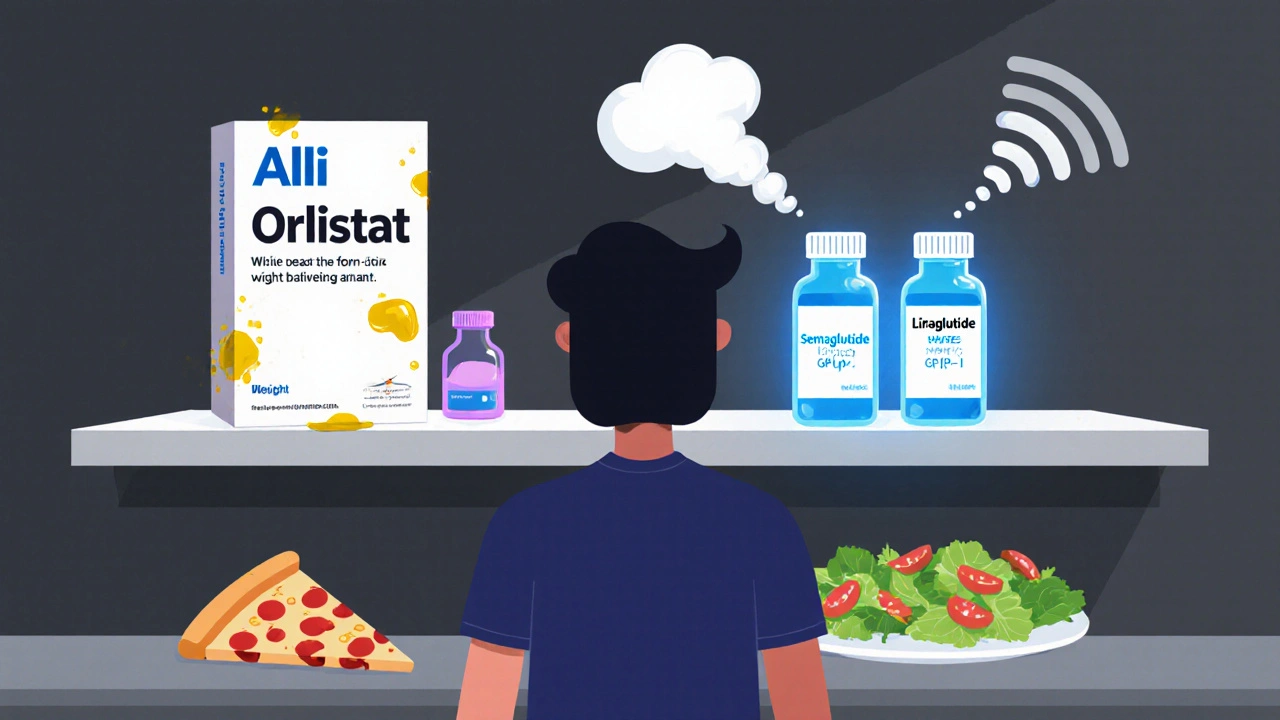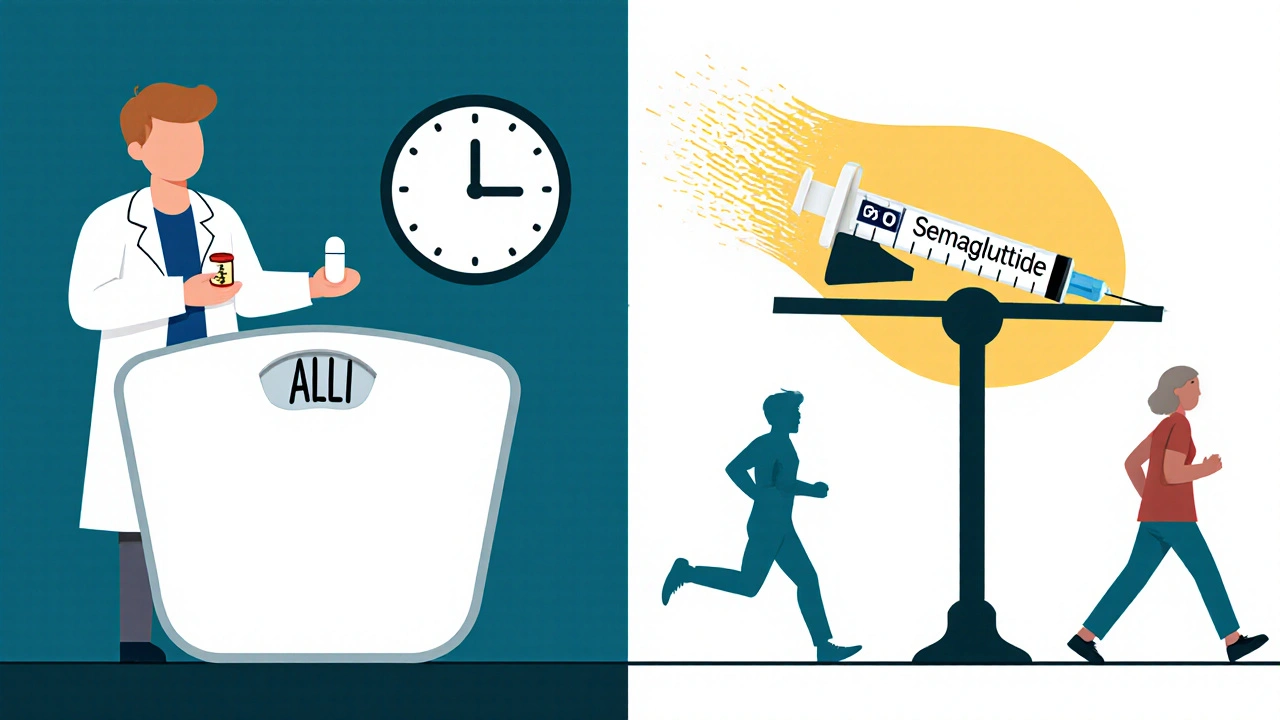
Weight Loss Method Calculator
Personal Weight Loss Profile
Every year, millions of people try to lose weight. Some diet. Some exercise. Others reach for a pill. Alli, the over-the-counter version of orlistat, has been a go-to for years. But is it still the best choice in 2025? With new options popping up, it’s time to see how Alli stacks up against the alternatives.
What Alli (Orlistat) Actually Does
Alli contains orlistat, a drug that blocks about 25% of the fat you eat from being absorbed. Instead of your body digesting it, the fat passes through your system and comes out in your stool. It doesn’t suppress appetite. It doesn’t boost metabolism. It just stops fat from sticking around.
This sounds simple, but it comes with side effects you can’t ignore. If you eat a meal with even a little fat - say, a slice of pizza or a spoonful of butter - you’re likely to get oily spotting, urgent bowel movements, or gas with discharge. These aren’t mild inconveniences. They’re embarrassing, unpredictable, and often make people quit.
Studies show people using Alli lose about 3-5% more weight than those on diet alone over a year. That’s roughly 5 pounds extra if you’d lose 15 without it. Not nothing. But not life-changing either.
Phentermine: The Prescription Powerhouse
Phentermine is a prescription appetite suppressant. Unlike Alli, it works on your brain, telling you you’re full faster. It’s been around since the 1950s, and it still works - fast.
People using phentermine typically lose 5-10% of their body weight in 12 weeks. That’s two to three times more than Alli. And the weight loss happens quickly, often within the first month.
But here’s the catch: phentermine is only approved for short-term use (up to 12 weeks). It can raise blood pressure, cause insomnia, and lead to dependence. It’s not for people with heart conditions or anxiety. And you need a doctor’s prescription, which means a visit, a check-up, and ongoing monitoring.
If you need fast results and are healthy enough, phentermine is far more effective than Alli. But it’s not a long-term fix.
Semaglutide (Wegovy, Ozempic): The Game Changer
When people talk about weight loss drugs today, they’re mostly talking about semaglutide. Originally developed for type 2 diabetes, it’s now used under brand names like Wegovy and Ozempic for weight loss.
Semaglutide mimics a hormone your body makes naturally - GLP-1 - that slows digestion and tells your brain you’re full. It doesn’t block fat. It changes your hunger signals. The result? People lose 15-20% of their body weight on average, sometimes more.
In one 2023 study, participants lost nearly 16% of their weight after 68 weeks. That’s 30-40 pounds for someone weighing 200. No oily stools. No embarrassing accidents. Just steady, sustainable loss.
The downside? It’s expensive. Without insurance, Wegovy costs over $1,300 a month. It’s also in short supply. Many people wait months just to get a prescription. And side effects? Nausea, vomiting, and diarrhea are common at first. But most people adjust.
Compared to Alli, semaglutide is a different league. It’s more effective, more comfortable, and more science-backed. But access and cost make it out of reach for many.

Liraglutide (Saxenda): The Middle Ground
If semaglutide feels too strong or too expensive, liraglutide (sold as Saxenda) is the middle option. It’s also a GLP-1 agonist, but less potent than semaglutide.
People using Saxenda lose around 8-10% of their body weight over a year. That’s still double what Alli delivers. It’s injected daily, which some find inconvenient, but it’s easier to tolerate than the side effects of Alli.
Cost is still high - around $1,000 a month - but it’s often cheaper than Wegovy. And since it’s been on the market longer, it’s easier to find. Many doctors are more comfortable prescribing it.
It’s not a magic bullet, but for someone who wants better results than Alli without the hype of semaglutide, Saxenda is a solid choice.
Over-the-Counter Alternatives: Garcinia, Green Tea, and More
The supplement aisle is full of weight loss pills promising miracles. Garcinia cambogia. Green tea extract. Caffeine pills. Apple cider vinegar gummies.
Here’s the truth: none of them work like Alli. They don’t block fat. They don’t suppress appetite in any meaningful way. At best, they might give you a tiny boost in metabolism or help you feel a bit less hungry.
A 2024 meta-analysis of 12 studies found that over-the-counter supplements led to less than 2 pounds of extra weight loss over 12 weeks - barely more than placebo. And some, like Garcinia, have been linked to liver damage in rare cases.
These aren’t dangerous for most people, but they’re not worth the money if you’re serious about losing weight. They’re distractions. Alli, at least, has a known mechanism. These? They’re marketing.

Lifestyle Changes: The Real Winner
Here’s something no pill will tell you: the most effective weight loss strategy isn’t a drug. It’s changing how you eat and move.
Research from the National Weight Control Registry shows people who keep weight off for years all do three things: they track what they eat, move daily, and eat protein and fiber-rich foods. That’s it. No magic. No injections. Just consistency.
One study found that people who combined diet and exercise lost 8% of their body weight in a year - more than Alli, without side effects. And they kept it off longer.
When you pair any weight loss drug with lifestyle changes, results improve dramatically. People on semaglutide who also cut back on sugar and added walking lost 25% of their weight. Those who didn’t change their habits? Only 12%.
Alli works best when you eat less fat. But if you’re going to change your diet anyway, why rely on a drug that makes you uncomfortable?
Which One Should You Choose?
Let’s cut through the noise.
If you want the cheapest option with no prescription: Alli. But only if you’re okay with messy side effects and slow results.
If you want fast results and are healthy enough: talk to your doctor about phentermine. Use it short-term as a jumpstart.
If you want real, lasting change and can afford it: semaglutide or liraglutide. They’re the most effective options on the market today.
If you want no drugs at all: focus on whole foods, protein, fiber, and daily movement. It’s slower, but it’s the only method that works for life.
There’s no perfect pill. But there is a best choice for your situation. Ask yourself: what’s your goal? How much discomfort are you willing to tolerate? And what can you actually stick with?
Final Thoughts
Alli isn’t gone. It’s just no longer the standout. It’s the old-school option - cheap, accessible, but clunky. Newer drugs like semaglutide have rewritten the rules. They’re not perfect, but they’re far more effective and easier to live with.
The real question isn’t whether Alli works. It’s whether you want to spend your time, money, and energy on something that barely moves the needle - or on something that actually transforms your life.
Weight loss isn’t about finding the strongest pill. It’s about finding the right fit. And for most people, that fit isn’t a capsule. It’s a habit.
Does Alli help you lose weight without changing your diet?
No. Alli only blocks fat from being absorbed. If you eat a high-fat diet, you’ll still gain weight - and you’ll have unpleasant side effects. To see any real results, you need to reduce fat intake. It doesn’t work as a magic fix.
Can you take Alli with other weight loss supplements?
It’s not recommended. Many supplements claim to boost metabolism or suppress appetite, but they haven’t been tested with orlistat. Combining them could increase side effects like diarrhea or nutrient loss. Stick to one approach and talk to your doctor before mixing anything.
Is Alli safe for long-term use?
Alli is approved for long-term use, but most people stop within a few months because of side effects. Long-term use can also lead to fat-soluble vitamin deficiencies (A, D, E, K). If you use it for more than six months, consider taking a multivitamin.
Why is semaglutide so expensive?
Semaglutide is a biologic drug - made from living cells - which makes it complex and costly to produce. Patent protections also limit competition. Insurance often covers it for diabetes, but not always for weight loss. Prices vary by country, but in the U.S., it’s still over $1,300 a month without coverage.
Do weight loss pills work better with exercise?
Yes. All studies show that combining any weight loss drug with physical activity leads to significantly better results. Even walking 30 minutes a day improves outcomes. Drugs help, but movement and diet are what make the difference long-term.


8 Comments
Been on Alli for 6 months and honestly? The oily leaks are worse than the extra pounds. I switched to walking 10k steps daily and cutting fried food - lost 18 lbs, zero side effects. No magic pill beats consistency.
It’s fascinating how we’ve outsourced our relationship with food to pharmaceutical corporations, isn’t it? We’ve turned the sacred act of nourishment into a transactional equation of calories and chemistry, as if the body were a malfunctioning engine that needs a proprietary bolt-on to function properly. Alli is merely the latest cog in this machine - a bandage on a bullet wound, marketed as a cure. We’ve forgotten that hunger is not a defect to be suppressed, but a signal to be listened to. And yet, we reach for the pill instead of the pause.
Of course Alli works - if your goal is to turn every dinner into a biohazard incident. Meanwhile, people are paying $1,300 a month for semaglutide while still eating pizza rolls. The real tragedy isn’t the cost - it’s the delusion that a drug can fix a lifestyle you refuse to change.
Bro in India we got this thing called 'roti, dal, sabzi' and walking after dinner - no pills, no injections, no drama. My uncle lost 30kg this way, he’s 72 now and still plays kabaddi. Alli? That’s for people who think food is the enemy. Food ain’t the enemy - laziness is. And yes I said it - you’re eating too much butter and too little lentils
I tried Alli once. One slice of pizza and I spent the rest of the night in the bathroom. I just started eating more protein and drinking water before meals. Lost 12 lbs in 3 months. No mess. No stress. Just… better choices.
Why are we even talking about Alli in 2025? It’s like comparing a flip phone to an iPhone and saying ‘well it still calls people’ - sure, but why would you? Semaglutide is the future and if you can’t afford it, then maybe your priority list needs a reboot. Also - who still eats butter? That’s not a diet, that’s a crime scene
Let’s be brutally honest: Alli is the placebo of weight loss - it gives you the illusion of action without requiring any real change. Meanwhile, semaglutide doesn’t just alter your metabolism - it rewires your desire. The real question isn’t ‘which drug works better?’ - it’s ‘why do we still tolerate the idea that weight loss should be uncomfortable?’ We’ve normalized suffering as a prerequisite for health. That’s not medicine. That’s punishment dressed as science.
Wait so you’re telling me the only reason people use Alli is because they’re too lazy to go to the doctor? And now we’re comparing it to semaglutide like it’s a fair fight? Bro, Alli is just fat-blocking diarrhea with a label. If you’re not willing to pay $1000 a month or change your eating habits - then you’re not trying to lose weight. You’re just trying to feel like you’re trying. Wake up.